 Petzlover
Petzlover Belgian Shepherd Dog (Malinois) is originated from Belgium but Red Heeler is originated from Australia. Belgian Shepherd Dog (Malinois) may grow 15 cm / 6 inches higher than Red Heeler. Belgian Shepherd Dog (Malinois) may weigh 18 kg / 40 pounds more than Red Heeler. Both Belgian Shepherd Dog (Malinois) and Red Heeler has almost same life span. Both Belgian Shepherd Dog (Malinois) and Red Heeler has almost same litter size. Both Belgian Shepherd Dog (Malinois) and Red Heeler requires Low Maintenance.
Belgian Shepherd Dog (Malinois) is originated from Belgium but Red Heeler is originated from Australia. Belgian Shepherd Dog (Malinois) may grow 15 cm / 6 inches higher than Red Heeler. Belgian Shepherd Dog (Malinois) may weigh 18 kg / 40 pounds more than Red Heeler. Both Belgian Shepherd Dog (Malinois) and Red Heeler has almost same life span. Both Belgian Shepherd Dog (Malinois) and Red Heeler has almost same litter size. Both Belgian Shepherd Dog (Malinois) and Red Heeler requires Low Maintenance.
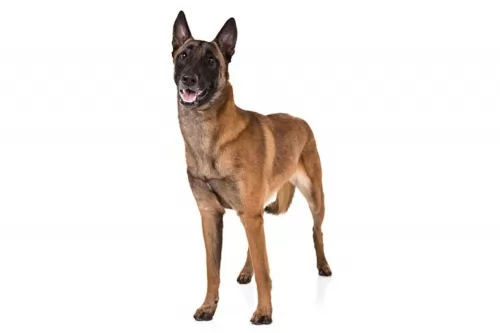 The Belgian Malinois is one of 4 Belgian Shepherd varieties. The dogs were developed- and hail from Belguim. The Malinois has a short, fawn colored coat. The American Kennel Club recognizes that the Malinois is a separate breed from the other 3 varieties. It was in 1892 that Professor Reul wrote the first Belgian Shepherd Dog standard, recognizing 3 varieties – dogs with short coats, dogs with long coats and dogs with rough coats.
The Belgian Malinois is one of 4 Belgian Shepherd varieties. The dogs were developed- and hail from Belguim. The Malinois has a short, fawn colored coat. The American Kennel Club recognizes that the Malinois is a separate breed from the other 3 varieties. It was in 1892 that Professor Reul wrote the first Belgian Shepherd Dog standard, recognizing 3 varieties – dogs with short coats, dogs with long coats and dogs with rough coats.
Today's Malinois goes back to a breeding pair owned by Adrien Janssens. It was in 1885 that he bought a fawn, rough-haired dog, breeding the dog with a short-haired dog named Lise de Laeken. After other breedings, the two dogs were recognized as ancestors of the modern Belgian Shepherd Dogs.
The city of Malines formed a club for the promotion of these fawn short hairs and the name Malinois became synonymous with them. In March 1992, the American Belgian Malinois Club received AKC parent club status.
 Known also as the Australian Cattle Dog, the Red Heeler is also known as the Blue Heeler. This is a breed of herding dog originally developed in Australia.
Known also as the Australian Cattle Dog, the Red Heeler is also known as the Blue Heeler. This is a breed of herding dog originally developed in Australia.
These dogs are known for their stamina and resilience with driving cattle over long distances in hot weather and across rough terrain.
It was George Eliott who developed the Red Heeler – crossing native Dingoes with Collies and other herding dogs.
In America, the breed was fully recognised in September 1980.
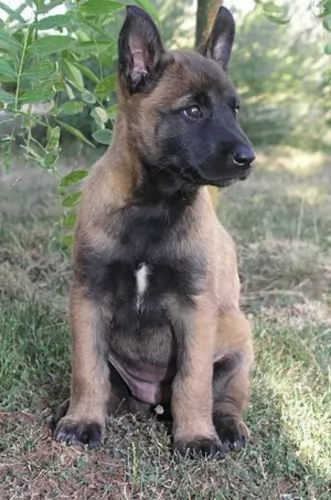 The Malinois is a medium-size Belgian shepherd dog. People sometimes mistake them for the German Shepherd as they are fairly similar to look at. The Malinois however is a smaller, lighter boned dog with naturally upright ears and a black-masked face. He is shorthaired and fawn-colored with black tips on the hairs, although other colors are brown or red too. He is an intelligent and active dog, always having been used for herding-, police- and rescue work.
The Malinois is a medium-size Belgian shepherd dog. People sometimes mistake them for the German Shepherd as they are fairly similar to look at. The Malinois however is a smaller, lighter boned dog with naturally upright ears and a black-masked face. He is shorthaired and fawn-colored with black tips on the hairs, although other colors are brown or red too. He is an intelligent and active dog, always having been used for herding-, police- and rescue work.
You’ll find the Malinois somewhat unpredictable as some are friendly and confident while other can be shy and withdrawn around strangers. This is a dog who loves to be around his human family, but to bring out the best in him, training and socialization classes will be necessary. Well-socialized Malinois are always good with children and other pets, more so if they’ve been raised with them.
 The Red Heeler is a medium-sized dog standing at between 43 to 51 cm in height and weighing in the region of 14 – 16 kg.
The Red Heeler is a medium-sized dog standing at between 43 to 51 cm in height and weighing in the region of 14 – 16 kg.
He is muscular, with a sturdy build. The coat of this robust dog is shortish and thick and quite often you’ll find a white star marking on he forehead. The coat is a blue-grey color or reddish. The tail of this dog is long and the ears are erect.
The Red Heeler has always been a working dog so he is energetic and lively, being independent and strong-willed.
He is super intelligent too and can be easily trained and socialized. He is a dog that simply loves the outdoors and if you don’t live on a farm, he is going to need lots of exercise.
He gets on well with kids and other pets, but children should be taught to respect him and be kind towards him, otherwise he might not tolerate them. He is a loyal, protective dog, wanting to ensure the safety of his human family.
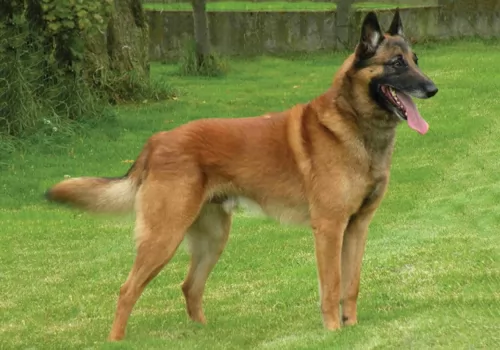 The Belgian Malinois makes a wonderful guard dog and he works hard to ensure that his human family, whom he adores, are well protected under his watch. They’re such intelligent dogs too that you may feel inclined to pass over some of your chores to him.
The Belgian Malinois makes a wonderful guard dog and he works hard to ensure that his human family, whom he adores, are well protected under his watch. They’re such intelligent dogs too that you may feel inclined to pass over some of your chores to him.
He responds well to training, and to get the best from this breed, start with training and socialization as soon as you bring your puppy home.
Socialization is excellent as it introduces your puppy to different people, animals as well as situations.
He is an adaptable dog and can live in an apartment if he is well exercised. He can be your devoted and loyal friend for a good number of years but you will have to do your part in providing him with the best care possible.
 When you bring a Red Heeler into your home, you must know that you’re never going to have a dull moment. They’re not content to lie around with nothing to do. These popular dogs literally coax you to come out and to be active.
When you bring a Red Heeler into your home, you must know that you’re never going to have a dull moment. They’re not content to lie around with nothing to do. These popular dogs literally coax you to come out and to be active.
Red Heelers need lots of activities and lots of room, so they aren’t particularly suited to life in the city. Large properties and plenty to do is what they ask for.
Your Red Heeler is going to make a splendid pet, loyal and devoted, the perfect example of man’s best friend.
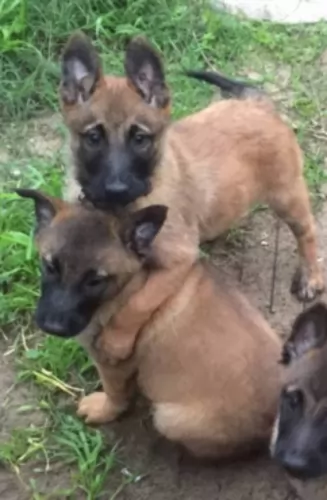 Belgian Malinois are generally healthy dogs. However every dog, regardless of breed, can pick up illnesses, and it is always wise to be aware of some of the diseases your Malinois might face.
Belgian Malinois are generally healthy dogs. However every dog, regardless of breed, can pick up illnesses, and it is always wise to be aware of some of the diseases your Malinois might face.
An inherited condition where the thigh bone doesn't fit properly into the hip joint. As the dog ages, arthritis can develop.
A degenerative eye disorder that can lead to blindness.
Brush his teeth at least 2 or 3 times a week to remove tartar build-up. Too much plague leads to inflamed gums, bad breath, pus inside the mouth and even loss of teeth.
 Your Red Heeler can live to be 15 years of age with good care. Every dog however, can fall prey to some of the many common dog diseases there are, some of which can be -
Your Red Heeler can live to be 15 years of age with good care. Every dog however, can fall prey to some of the many common dog diseases there are, some of which can be -
There are quite a lot of congenital and inherited musculoskeletal disorders in dogs, with some of the more common ones being hip dysplasia and muscular dystrophy for instance.
There are some of these musculosceletal problems which can be fatal. Some of the typical symptoms you’ll see with these problems are difficulty climbing stairs or jumping, loss of muscle mass in the hind limbs, arthritis and lameness.
The retina of the eye is that light-sensitive part and which is part of the central nervous system. With retinal degeneration, the cells decline, leading to impaired vision and sometimes even blindness.
Some symptoms to look out for include dilated pupils, night blindness and the inability to see clearly in bright light. The disease worsens over times with sudden blindness being quite common with older dogs. Your vet will want a thorough history of your dog’s health.
Other dog diseases to be very aware of are cancer, obesity, bloat, hip dysplasia and epilepsy.
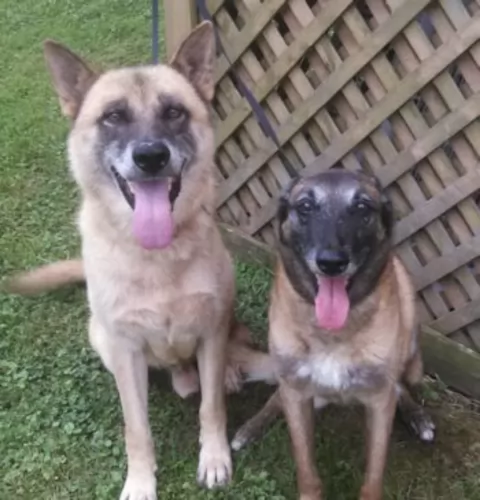 Because the Malinois is a constant shedder, with a couple of heavy shedding periods during the year, you’ll need to be conscientious with his grooming and brush him at least twice a week to get rid of loose hairs and to give his thick coat a glossy, healthy look to it.
Because the Malinois is a constant shedder, with a couple of heavy shedding periods during the year, you’ll need to be conscientious with his grooming and brush him at least twice a week to get rid of loose hairs and to give his thick coat a glossy, healthy look to it.
Because of their high energy, Malinois aren’t recommended for couch-potato type owners. It will be cruel to buy such a dog and to leave him to waste away with boredom and frustration in your back yard. He’ll want lots of rough and tumble, ball games, runs in the park or in the country and long walks.
Belgian Shepherd Malinois puppies are vulnerable when they’re tiny, and it would be wise to speak to your vet about superb nutrition to build up a puppy’s immune system.
An excellent way to ensure the health of your growing Malinois is to give him a home prepared meals along with commercially manufactured food recommended by your vet. You can’t just put a bowl of commercially manufactured dog food in front of him day after day month after month.
Apart from what your vet recommends, give him some brown rice, some cooked vegetables and some raw meat. Raw meat will ensure he can fight of skin infections. The age of the dog, emotional state and environmental influences can all play a role in skin diseases with dogs, but by ensuring some raw meat in his diet, the immune system is strengthened and skin disorders are eliminated. Always ensure a steady supply of fresh water.
 The Red Heeler is an active dog, and apart from walks which will give him the chance to sniff around, he will need lots of other forms of exercise. Rope pulling games he’ll love and running after a ball will please him because it takes him back to days when he used to run around and herd livestock.
The Red Heeler is an active dog, and apart from walks which will give him the chance to sniff around, he will need lots of other forms of exercise. Rope pulling games he’ll love and running after a ball will please him because it takes him back to days when he used to run around and herd livestock.
If you’re an outdoorsy type of person who loves hiking in the wilds and swimming in rivers, you can count this dog in.
You can look at the Red Heeler as a low maintenance dog. He does shed, but a good brush of the coat twice a week will be excellent for him. If he doesn’t wear his nails down naturally, you will need to trim them. Also, while you are brushing him, check his ears and eyes and inside his mouth to make sure he is clear of all infections.
Red Heelers rely on good food for their resilience and stamina, and for convenience it is good to have commercially manufactured dog food as a backup. The best is home-made food which is easy to prepare and totally uncomplicated.
Simply add into one big pot chicken, brown rice or pasta and spinach, sweet potatoes and carrots. This food can all be chopped up, refrigerated and added warmed up and in small portions to your pet's dry kibble once or twice a week. Simple and tasty, your Red Heeler will love it and thrive on it too.
Ensure there is always a bowl of fresh, cool water within his reach.